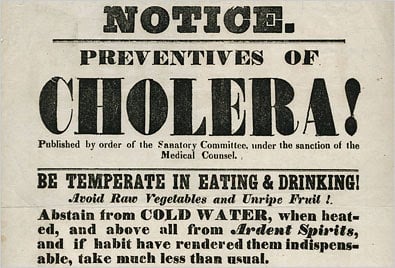With most of us confined to our homes, jaw-dropping unemployment figures, and over 60,000 deaths worldwide as of April 2020, it seems like COVID-19 is bringing the word “pandemic” to a whole new level. For citizens of high-income countries it is a first, and most likely a once in a lifetime experience. But COVID-19 is not the only pandemic currently ongoing.
The seventh wave of the cholera pandemic started in 1961, and to this day continues to plague low-income countries. According to the World Health Organization, it is the world’s longest running pandemic.
The first six cholera pandemics occurred consecutively between 1816 and 1923. The virus struck many Asian countries, but Japan was especially affected by the third and fifth wave. During an outbreak in Tokyo in 1858, between 100,000 and 200,000 people died. Twenty years later, during the fifth pandemic, Japan lost around 90,000 civilians to the disease.
Mildred Ringwalt and her husband, former Foreign Service Officer Arthur Ringwalt, spent the summer of 1939 in the mountains of Japan. In this “Moment” in U.S. diplomacy, we learn that on their way back to post, the Ringwalts came into contact with someone who became violently ill with cholera. Given what had happened in the past, Japan chose to immediately quarantine a group of tourists, among them Mrs. Ringwalt and her five-month-old baby. When the first negotiations failed, Ringwalt herself spoke to the Japanese consul and convinced him to allow the group to leave.
Mildred Ringwalt was born Mildred Minor Teusler to American parents in Tokyo, Japan. She married her husband, Foreign Service Officer Arthur Rumney Ringwalt, in 1938, and accompanied him on his assignments in Washington, DC and abroad.
Mildred Teusler Ringwalt’s interview was conducted as a part of the Foreign Service Spouse Series.
Read Mildred Teusler Ringwalt’s full oral history HERE.
For more Moments on negotiating in the midst of a health crisis click HERE.
Drafted by Ianthe Van Dyck
ADST relies on the generous support of our members and readers like you. Please support our efforts to continue capturing, preserving, and sharing the experiences of America’s diplomats.
Excerpts:
“Someone in the milling crowd had suddenly become violently ill with cholera, and all of us were, therefore, quarantined!”
RINGWALT: Our second summer in Peking, cholera was epidemic, and preventive shots were given at the railroad station. Arthur applied to go to Tokyo as a courier and learned that a man had passed out the previous day on receiving his fourth injection in as many days.
…
No One Would Be Permitted to Leave:
Arthur and I spent our first vacation at Karuizawa in the mountains of Japan with my mother and sister who were visiting there. On our return trip, we disembarked at Tanggu, China, expecting to proceed by train to Peking with our baby. Fortunately, I went ahead of Arthur and was outside the building when we heard over the loudspeaker that no one would be permitted to leave. Someone in the milling crowd had suddenly become violently ill with cholera, and all of us were, therefore, quarantined! We were told we would have to go to a camp for observation for three weeks. I was horrified at the thought of going through such an ordeal with our five-month-old baby.
The Dreaded Disease:
When the announcement was made, there were some ten to twelve persons, mostly British, who happened to be outside the building with their friends and relatives from Tanggu who had come to welcome them back from Japan. I joined this group, and together we hired rickshaws and were taken to the British clubhouse on the outskirts of the city. I could see Arthur gesticulating to me as we took off, but I did not dare wave to him for fear of being forced to go back inside. The club was peaceful and quiet after the confusion and noise of the harbor. Best of all, there were practically no flies, where (at the station before) there had been dozens plastered on my baby’s face and hands. Every fly could be a carrier of the dreaded disease.
Fighting the Flies:
The group conferred together and then decided to send our most distinguished member to plead with the Japanese Consul to free those still being held in the building. That failed, and I then volunteered to try, since I was born and brought up in Japan and spoke a little of the language. As I passed the building where my husband was being held with many others, he waved to me, but I did not dare to wave back. The Consul was expecting me and politely listened as I explained how serious it was for everyone if we were not allowed to leave. I told him of the anxiety we felt if the authorities continued to hold the group in the building.
Suddenly he agreed that we could all go free, and I raced back in the rickshaw to the group at the club to tell them the good news. We had missed the train for Peking and we had to wait a long time for the next. I spent the hours fighting flies, but it was such a relief that our family was reunited that I could feel only gratitude.
TABLE OF CONTENTS HIGHLIGHTS
Married Foreign Service Officer Arthur Rumney Ringwalt in 1938
Peking, China 1938–1941
Richmond, Virginia 1941–1943
London, England 1949–1957
Kingston, Jamaica 1957–1959

